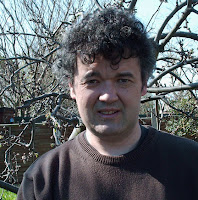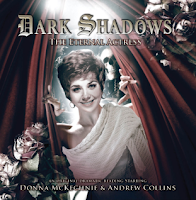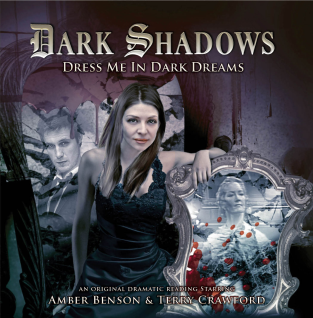Marty Ross is no stranger to audio drama. Having written a number of scripts for Big Finish and the BBC, it was only a matter of time before he was drafted to write an episode of Dark Shadows.
His first professional visit to Collinwood,
Dress Me in Dark Dreams, will be available for sale as CD and digital download from Big Finish on April 30. It's not only Marty's first trip to Collinsport, but Amber Benson's, as well. The
Buffy the Vampire Slayer alumnus plays a young Judith Collins, starring alongside Dark Shadows veteran Terry Crawford. You can listen to a trailer for the episode
HERE.
When Marty agreed to do an interview for this site, I immediately packed my bags and hopped on The Collinsport Historical Society's private jet for his home in Great Britain. The flight attendants and some guy identifying himself as a federal marshal politely informed me that the airplane belonged to British Airways, and that spray painting the words "Collinsport Historical Society" on the fuselage does not qualify as a legal transfer of property in any country.
Robbed on my transportation across the Atlantic, I decided to e-mail my questions to Marty. You can read his responses below.
*
Thanks to time
traveling, astral projection and the occasional holes in reality, the original
television show and previous Big Finish stories have left few unexplored
settings. How did you settle on this particular time period for your story?
 |
| Marty Ross |
Big Finish gave a
whole list of characters and eras they were interested in dealing with. I saw
they were interested in a Judith/Edith story and I pitched for that, in part
because I like writing for strong female characters, but also because I wanted
to write a real grand-style gothic romance and a 19th. century setting seemed
ideal for that. I'm a big devotee of the 19th. century gothic tale, of the
Bronte sisters and Sheridan LeFanu and so on, as well as the reinvention of
that kind of gothic in things like the Dark Shadows 1890s sequence, the Hammer
films and the 'gaslight' melodramas of 40s Hollywood. Precisely because people
- certainly people of the social rank of the Collins family - were much more
strait-laced in that era, it gives a whole extra frisson to the idea of a young
woman brought up that way casting caution to the winds and having a passionate,
sensuous affair - with a phantom lover, at that. The tensions between what a
respectable young woman is and isn't supposed to do are all the more extreme
and tension, of course, makes for drama.
From a storytelling point of view, what
is the appeal of Judith Collins?
Well, one obvious appeal for me, and this is a thing that
runs through a lot of my work, is that I'm happiest as a writer writing strong female
characters - and Judith is nothing if not that. The biggest influence on my life was my maternal grandmother, who had been born in 1909 as
part of a family of seven sisters and when as a kid I'd go visiting these
great-aunts it was almost like Collinwood, with these grand old ladies living in Victorian tenements chock-a-block with old-fashioned
decor - and if there was any family business outstanding, these great-aunties
would creep off into shadowy back rooms to discuss it all in whispers. So that
kind of pre-modern world of female experience is less distant to me than to
most people of my generation! And my grandmother was basically a Bronteesque
romantic disguised as a rather conservative older lady, so I know from first hand that
dichotomy between an almost Victorian respectablity and a more passionate inner
nature - maybe in part I'm paying tribute to her: she'd have loved Dark Shadows if it had only been on British TV.
Prequels are
notoriously difficult to write because the audience frequently enters the story
already knowing how it ends. How did you approach this issue with Judith, given
that we already know there’s a dark, violent future ahead of her?
I think the story gains extra tension from knowing what Judith's future is. We
know Judith as this rather stern older woman, but I thought wouldn't it be
poignant if as a younger woman she started out as someone much more romantic and open-minded, more Jane Eyre than Mrs. Danvers,
and then this becomes the story of how experience forces a darker, more
pessimistic vision on her, so that at the end of Dress Me you see this younger,
brighter figure beginning to morph into the older Joan Bennett character. If
she's simply a junior version of Joan Bennett right from the get-go, then there
isn't the drama - ultimately, maybe, the tragedy - of seeing that transition
begin right in front of you.
Basically, the more you know about the character's future, the more poignant
you'll find the place where she's left at the end of this story, precisely
because there's a vanishing hint of how things could have been otherwise. There's one moment where Edith expresses a genuine hope
for Judith's future - but the way she expresses this will set off alarm bells
in the heads of listeners who know what lies ahead for Judith: it's not just an in-joke, it's more the tragic irony that Edith is
trying to pass on a blessing, but the blessing will really turn out, in the
fullness of time, to be a curse. So the listener's knowledge of Judith's
future is employed as a kind of dramatic element in the story: Hitchcock said
that suspense was when you let the audience know well in advance there's a bomb
ticking under the table where your characters are chatting happily. In a sense,
Judith's future - as defined by the TV show - is the bomb ticking under the table
here.
How did Amber Benson prepare for the
role? Did Big Finish provide reference material to help familiarize her with
the series?
You'd have to ask James Goss and Joseph Lidster at Big Finish about the
specifics of casting, and working with, Amber. I finished the script and was
just told they had something fantastic in the works with the casting: I thought
maybe they just meant they'd cast someone slightly dull out of Coronation
Street. Then next thing I knew Amber was playing the lead. But unfortunately I
didn't get a ticket to LA to hear her perform! Certainly, we writers were given access to the original TV
episodes, so most likely Amber was too.
If you had the opportunity to write another
Dark Shadows story, which character would you want in the lead?
I don't want to preempt Big Finish's decision on whether I get to do another
one: they seem to have liked the script, but we still need to see if it works
for listeners! Certainly, I'd love to do more: my interest in the series goes right back to my childhood when the bargain bin in
my local Glasgow Woolworths used to be filled with Marilyn Ross paperbacks (I
even had the Barnabas Collins Joke Book!) - and I read all the US monster mags,
which always had a lot of Dark Shadows material. So I feel quite at home at
Collinwood.
As far as specific characters and stories are concerned, when I was pitching
this, there was one other idea that they seemed to like, centred around Maggie
Collins, married to Quentin (i.e: 70s parallel time), but being trapped in a confrontation with John Yaeger/Cyrus Longworth -
as a Scot, I'm very attracted to the Jekyll/Hyde theme. That would be a really great, more modern psycho-thriller,
and Kathryn Leigh Scott is someone I'd love to write for.
I also had an idea for a story about Eve, who's a great character, but Nicholas
Blair was also involved and it hadn't been quite decided at the time what to do
with Blair in terms of casting, etc. so the idea was sidelined. But I'd still
like to do something with Eve.
But at the end of Dress Me In Dark Dreams, I also wanted to leave open the
possibility of another story or two based around this younger incarnation of
Judith: we talked about her in the final scene becoming wholly like the older Judith, but as it is there's a hint that the younger,
more romantic self is wounded but not quite finished off, leaving open the
possibility for more adventures for this version of Judith and Edith. But, of
course, I'd love to write something for Lara Parker too: I'm a romantic
dramatist - nothing inspires me like a great actress - and Dark Shadows has
plenty of those!
Tom Baker and Dark Shadows. How do we
make this happen?
Heaven knows, it took Big Finish long enough persuading him back into the
Tardis! Certainly, he's a terrific actor and it's worth remembering how good he
is at bad guys: he was a terrific Rasputin. Maybe it's 1914 and a mysterious refugee with a Russian accent turns up at the
door of Collinwood on a stormy night, looking more dead than alive....
But,
to be serious, you'd have to pester the producers at Big Finish (way above my pay scale!) and they'd have to pester the great man
himself!


